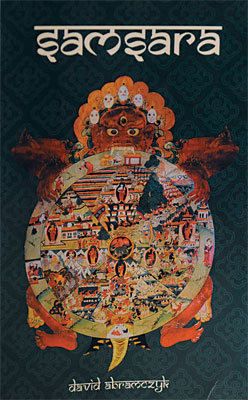Samsara entertains with an offbeat look at Nepal
It’s bad enough to be broke and working for a drug dealer. But when the pusherends up on the business end of a knife and no one is around to prove you weren’t holding it, what’s a guy to do? If you’re Jupiter - global drifter, protagonist of Samsara and professional maker of bad choices -you take a break to sample the wares, at which point the notion of heading to Nepal with some hash strapped to your body seems like a promisingway out of the mess.
 Or maybe not, as our hero realizes dimly when his brain clears in a Kathmandu jail.Whoops.
Or maybe not, as our hero realizes dimly when his brain clears in a Kathmandu jail.Whoops.
And so Jupiteris introduced to Nepal.He’s got a few names from his late boss’s past and a suspiciouslyhelpful woman from an embassy family to get him out of Shangri-La and away from a future ofdal bhaat behind bars. In the processof making his roundabout escape on a route that could be sketched by Escher, he hikes his way into a bloody piece of history that an old CIA agent would rather forget.
Samsara is the strikingly well-written debut novel of David Abramski, an American who has been in and out of Nepal for 20 years, ever since he first spotted a study-abroad ad in a Colorado newspaper. (As a writer, he uses his family’s original Polish name of Abramczyk.) When not in Nepal, he does things like sail across the Pacific and Atlantic; here, he’sa rafting guide and Himalayan climber planning to summit Makalu this month. He packs much of his considerable experience of Nepal and its mountains into this wryly told tale of high misadventures.
Think of it as Fear and Loathing in the Himalayas with Alfred Hitchcock in the plot writer’s chair.Or think of the edgy,pop-culture laden humor of Neal Stephenson’s Snow Crash, except that instead of cyberpunk and science fiction, it’s Himal-punk anda Nepal so bizarre it looks just like home.
Jupiter may be hard-boiled, half-baked and too often toasted, but he’s also a sharp, observant everyman and we’re on his side as he finds himself on a collision course with some harsh realities and his own ghosts in a land with few road maps.Ending up in Kathmandu almost by accident, he’s both utterly unprepared and hilariously perceptive.The author, through the voice of Jupiter, says the kinds of things that many foreigners in Nepal (and a fair number of Nepalis) have vaguely thought about our beloved home but were always too polite,or just not clever enough,to articulate. His sense of the ludicrous amid the pileup of calamities is a big part of the pleasure of the book. You’ll recognize Samsara’s Nepal.
Well, most of it. I did tend to make a few mental comments like “the Immigration Office isn’t in Thamel anymore,” or “if he’d set it during the insurgency, the idea that everywhere from Nepalgunj to Humla was ‘guerilla territory’ and hence full of checkpoints would work a lot better.”But if you’re not in Nepal, you won’t notice. And if you are, catching the occasional rubber-band stretches of reality is part of the fun.
They’re more than made up for, anyway,by the offbeat mix of off-the-wall plot and off-the-cuff commentary, East-West edition. After all, this must be the first book ever to pack the CIA, Israeli tourists, dot-pen beggars, unpeaceful Free Tibetans, Betty Boop, tea-drinking Kathmandubureaucratsand veggie burrito sellers at Grateful Dead shows into one narrative. Samsara may refer to the wheel of suffering, but at least we’re enjoying theride.










